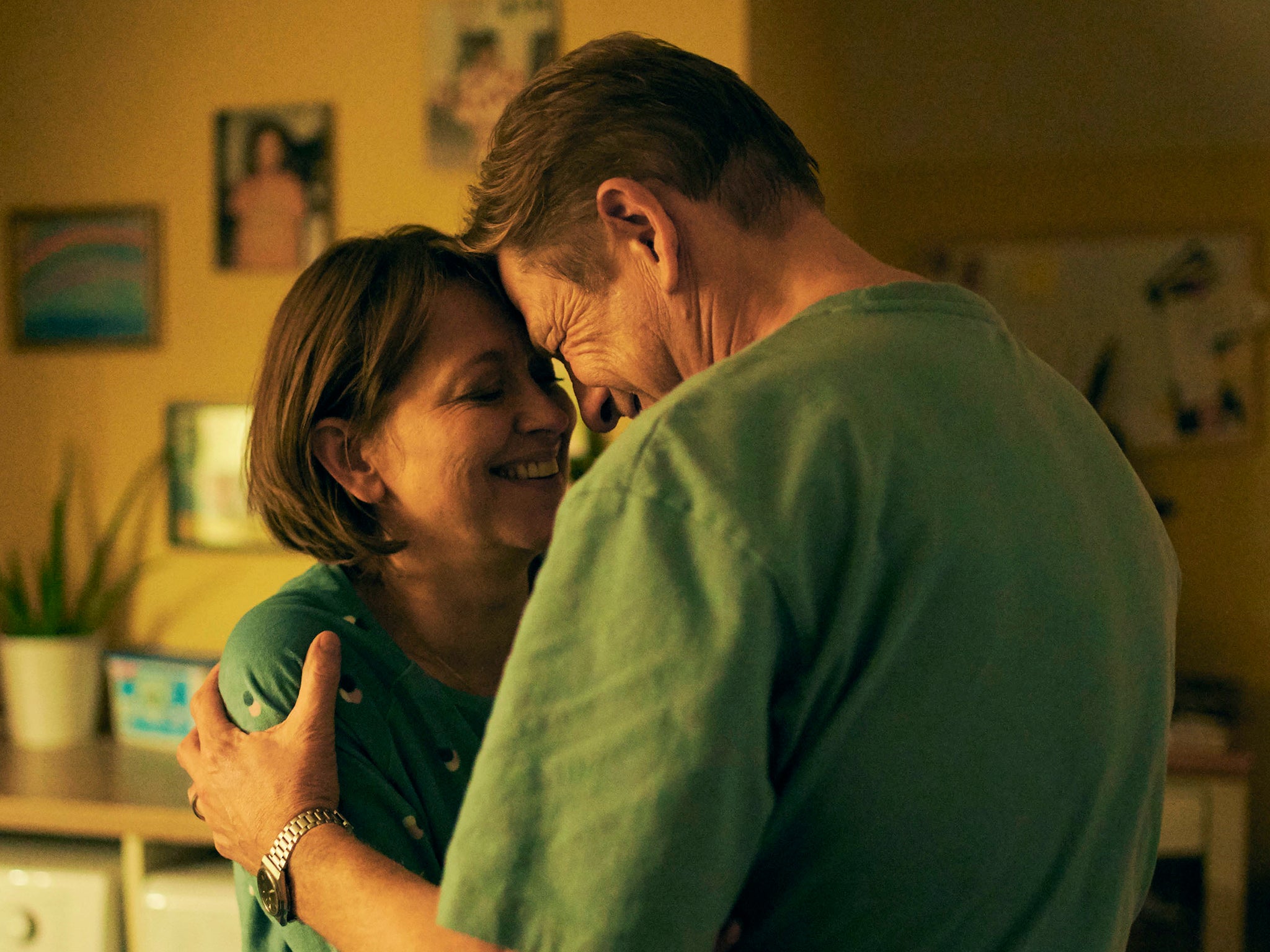Marriage is largely tedious – Sean Bean’s new TV series finally gets it
No smashed plates. No screaming rows. No custody battles. Stefan Golaszewski’s BBC drama about a 27-year-old partnership is unusually honest about the lethargy of long-term cohabitation, writes Fiona Sturges


In the opening episode of Marriage, husband and wife Ian and Emma clean up after having their daughter, Jess, and her new boyfriend, Adam, over for dinner. We watch as food is silently scraped from plates into the compost bucket, knives and forks are rinsed and put in the dishwasher, and empty cans put in the recycling. Only once the table is cleared and the dishwasher loaded, and the pair are preparing for bed, is the verdict on Adam finally delivered: “I hated his f***ing face,” says Emma.
This new drama from award-winning writer Stefan Golaszewski (Him & Her, Mum) is an intimate portrait of a 27-year-old partnership. It is also among the most wilfully mundane depictions of marriage ever committed to the screen. Ian and Emma – played by Sean Bean and Nicola Walker – appear content enough, though they are past the stage where they feel the need to show it. Much of their communication takes place via the weird telepathy that often exists between long-term couples, meaning that entire scenes pass by wordlessly. Time stretches out as we see them sort through their post, or watch TV while sharing a packet of prawn crackers, or declutter the spare room. Irritation bubbles up by way of hissed asides or heavy sighs, each bearing the weight of old arguments they can’t be bothered to rehash. Ian and Emma’s long silences sometimes feel cosy and endearing, but at other times are uncomfortable. The Pinter pause has got nothing on this.
Film and TV has long been fascinated by the workings of romantic love, though it tends to be more concerned with moments of high drama. Ingmar Bergman’s 1974 series Scenes from a Marriage, remade last year with Jessica Chastain and Oscar Isaac, saw a couple declare their marriage solid, then split up and subsequently go through the marital equivalent of the seven stages of grief. In the BBC series, Together, Sharon Horgan and James McAvoy’s cohabiting couple demonstrated the fine line between love and hate while marooned at close quarters during lockdown. Marriage Story, from 2019, had Adam Driver and Scarlett Johansson’s estranged spouses screaming at each other about which of them hated the other more. Perhaps the most depressing of all marriage portraits is the Oscar-festooned Kramer vs Kramer from 1979, depicting a wife (Meryl Streep) beaten down by motherhood and a husband (Dustin Hoffman) married to his job. When she walks out and then returns 18 months later to claim her son, a grim custody battle ensues.
In Marriage, there are no screaming matches or dramatic walk-outs. Crockery remains resolutely un-thrown. In declining to submit to the demands of conflict-based drama, Golaszewski gives us an unusually honest portrayal of human cohabitation, dispensing with plot in favour of the dreary minutiae of domesticity. As such, it demands a lot of patience from the viewer. There is only so much time you can spend watching Sean Bean loading a dishwasher before lethargy sets in. Both parties can also be intensely (and purposely) annoying: her with her banal prattling, him with his needy hovering when his wife is patently busy.
Ian and Emma’s interactions reminded me not so much of fictional dramas than the recent Showtime series Couples Therapy, which allowed us to go behind the closed doors of a therapist’s office and eavesdrop on spouses bickering over household tasks, social arrangements, or the daily grind that is parenting children. Under the watchful gaze of therapist Orna Guralnik, a raised eyebrow or an eye-roll took on a grave significance. As her clients’ stories unspooled, and entrenched behaviours emerged, the viewer moved from being a neutral observer to casting judgment over a spouse who didn’t listen, or who always thought they knew best, or who so feared being abandoned that they sabotaged the relationship.
With Ian and Emma, much remains unspoken, though that doesn’t stop the viewer from quietly acting as therapist. There is a reason why Ian is so obsessed with buying shower gel that labels itself “revitalising”, and why he lingers awkwardly around the staff at supermarkets and at the gym, longing for them to ask how he is doing. We glean early on that he has been made redundant from his job, while Emma seems to be flying high at hers. Neither are keen to acknowledge how this is affecting them.
For some, Ian and Emma’s day-to-day existence will seem depressing, with its quiet routines and total absence of spontaneity. Others will recognise the natural slow-down, the barely conscious narrowing of one’s existence, that happens to couples as they ease into mid-life and as their children grow and become independent. At one stage, Jess bemoans her father’s introverted ways, taking his silence as indicative of a non-existent inner life. During another visit home, she complains to her mother that the family never talk about “real” issues – and yet when she presses Emma to reflect on a past trauma, she is shocked by what she unleashes. If there’s one thing we can learn from Marriage, it’s that some things are left unsaid for a reason.
‘Marriage’ is on Sunday 14 August at 9pm on BBC One
Join our commenting forum
Join thought-provoking conversations, follow other Independent readers and see their replies
Comments


Bookmark popover
Removed from bookmarks